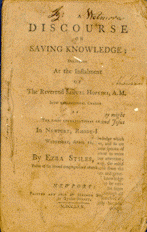
Rev. Samuel Hopkins
2013 is a special year for Newport, for Rhode Island and for the nation. It is the 350th anniversary of the Rhode Island Colonial Charter, one of the nation’s earliest compacts to affirm religious toleration and freedom. It is the 250th anniversary of the completion of Newport’s Touro Synagogue, the oldest synagogue in America and the place in 1790 where President George Washington reaffirmed the importance of civil liberties and citizenship regardless of religion. And 2013 is the 50th anniversary of the March on Washington for Jobs and Peace. The connecting theme between these three historic anniversaries is the recognition of all people’s inherent rights of personal and civil freedoms.
As we celebrate the importance of our cherished freedoms in America, we should also recognize that well before civil and human rights leaders such as Abraham Lincoln, Fredrick Douglas, and Martin Luther King, there was a bold minister in 18th century Newport who had the audacity to believe – and preach – that all men were created equal.
Revered Samuel Hopkins was installed as the minister of the 1st Congregational Church in Newport on April 11, 1770. A graduate of the Yale Divinity School and strict interpreter of the scriptures, he arrived in the town at a time when it was a leading American slave port. Once settled in the pulpit and the community, Rev. Hopkins quickly becomes an early Abolitionist preaching fiery sermons from his Newport pulpit on the evils of slave trade and ownership. He went as far as requiring his congregants either end their participation in slavery or leave the church. Many left the church.
At the same time, Hopkins becomes one of the early American leaders of the Great Awakening religious movement. A Christian revitalization crusade that swept Protestant America in the mid-18th century, the movement brought a deep personal revelation of the need of salvation by and through Jesus Christ and was demonstrated by good deeds while on earth. A major by-product of the movement was to bring Christianity to the African slaves. Over the course of the late 18th century, hundreds of enslaved and free Africans in Newport were converted to the Christian faith, principally in the Congregational and Baptist churches.
As Hopkins interacted with Africans on a daily basis on a personal and spiritual level, he comes to believe that once accepted into the faith, they were entitled under one God “to full rights of civil and personal liberty.” It would take a Civil War nearly 100 years later and a Civil Rights movement for another 100 years after that for the rest of the nation to catch up to the progressive thinking of Reverend Hopkins.
In early 1776, several months before the signing and publication of the Declaration of Independence, Hopkins would print and issue his own document promoting liberty and freedom on behalf of the half million African slaves within the thirteen American Colonies. The pamphlet entitled, “A Dialogue Concerning the Slavery of the Africans,” was addressed “To the Honorable Members of the Continental Congress, Representatives of the Thirteen United American Colonies.” This extraordinary document begins with one of the most powerful introductory statements on universal and inherent freedom of all:
“As God the Great Father of the Universe, has made you the fathers of these Colonies, and in answer to the prayers of his people, given you counsel, and that wisdom and integrity, in the excretion of which, you have been such great and extensive blessings, an obtained the appropriation and applause of your constituents, and the respect and veneration of the nation in whole fight you have acted, in the important noble struggle for LIBERTY. We naturally look to you on behalf of the more than half million of persons in these Colonies, who are under such a degree of oppression and tyranny, as to be wholly deprived of all civil and personal liberty, to which they have as good a right as any of their fellow men, and are reduced to the most abject state of bondage and slavery, without any just cause.”

1770 Installation Sermon of Samuel Hopkins
Hopkins would dedicate his entire life to the abolishment of slavery and the promotion of Christian learning and personal freedom for Africans in America. Later he would support free Africans in 1780 to establish the African Union Society in Newport becoming the first African benevolent society in America. This society would later evolve into the Union Colored Congregation Church, utilizing property from Hopkins’s 1st Congregational Church.
Proudly, our family owns an original printing of his Installation Sermon in 1770 in Newport. It is more than an ancient keepsake, but a lasting reminder that the Civil Rights movement had its early beginnings in my own community of Newport, RI.
-KS
- TO BE SOLD: African Slave Advertisements in Colonial Newport - December 4, 2014
- A Woman of Valor - October 3, 2014
- Preparing for Conflict Overseas and at Home - August 29, 2014